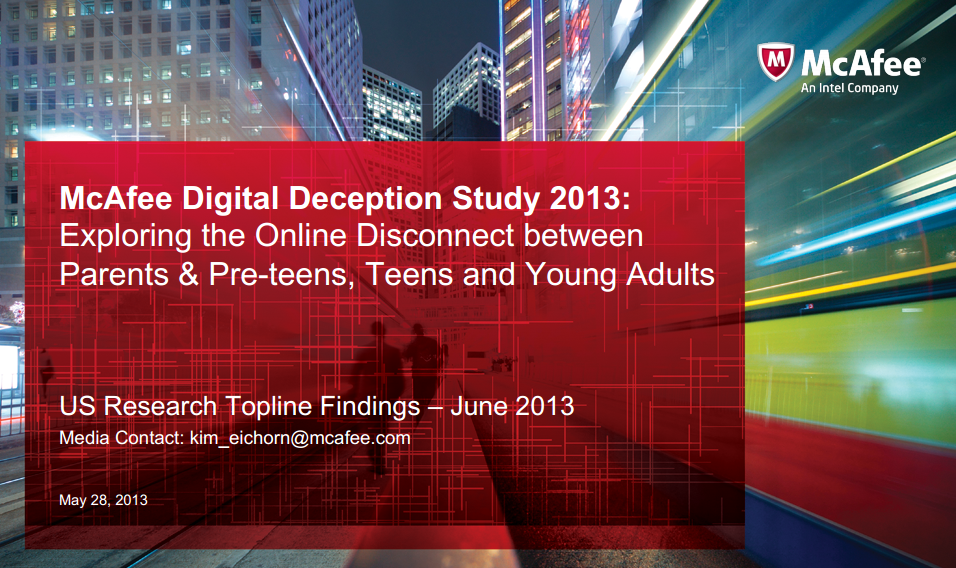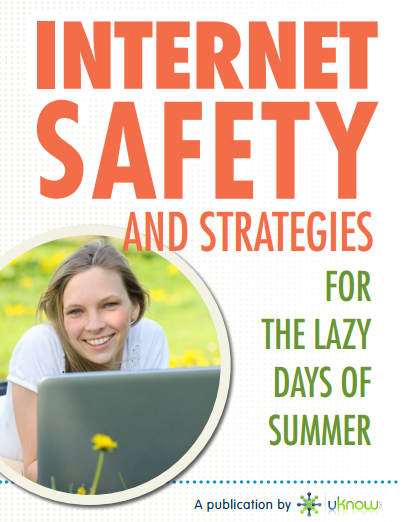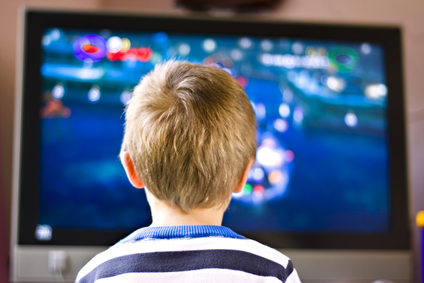View the SlideShare on our Internet Safety eBook. This is a short and sweet version of our full length eBook that you can download for free here. Learn why summer can be a dangerous time for kids to be on the Internet for lenghty amounts of time, the importance of technology in their lives, how to strike a balance and much more!
Digital Parenting: Be The Best You Can Be
You know kids. They live, breathe, eat, sleep and play in a digital world. There's no denying this fact and there's no going back.
You may long for a time when families sat around the dinner table and talked to each other. You may wish for more face time, actual conversations, even if it is with a telephone. However, our plug-and-play digital society is entrenched and intrusive. This is where Digital Parenting comes in.
So, how does Digital Parenting work? First, establishing boundaries is key. Your kids, and most likely you, are attached to your cell phone and mobile communications device. It is the way of today's world. You can practice examples that will help make you an accomplished Digital Parenting professional.
First example: Kids mimic what their parents do and say. If you are on the cell phone while driving with your child, they determine this to be normal behavior. If you are texting with a friend, co-worker or family member during a conversation, they also see this as acceptable.
Do You Know What Your Tween Is Up To Online? This Study Says No
Remember when we told you about the new study done by McAfee concerning children, parents and the online disconnect?
As part of Internet Safety month, we are proud to say that we got Robert Siciliano, an online security expert at McAfee to comment on the study's findings. Read his guest post for uKnowKids below.
Parents: Do You Know What Your Tween Is Up Too?
In McAfee’s 2013 study “Digital Deception: Exploring the Online Disconnect between Parents and Kids” that examines the online habits and interests of preteens, teens, and young adults and finds there is a significant disconnect between what they do online and what their parents believe they do.
While youth understand the Internet is dangerous, they still engage in risky behavior, hiding this activity from their parents in a variety of ways, and acknowledging that they (46%) would change their behavior if they knew their parents were paying attention.
Teens Abandoning Facebook for Twitter?
The social network training wheels parents provided for Facebook are beginning to shift to something new now that teenagers are moving more exclusively to other social network sites like Twitter. With adults seeming to be taking over Facebook and the endless battles over privacy issues, can teens really find more peace, tranquility and safety over at Twitter? According to a Pew Report, kids were finding better methods of expression on Twitter (and Instagram) than Facebook has ever provided.
Guest Post: Creating a Tween-Friendly Environment On Social Media
Whether we like it or not, we all know that tweeners are more active on social media now than ever.
Take a look down any hallway in a middle-school, and you will see kids everywhere hiding their smart phones in their lockers and bags to make a quick text or social media update.
We don't need to review the consequences and dangers of children being online unattended. We see stories about it each night on prime time TV. Horrific stories of children being abducted and held in the custody of demented strangers.
Download Our Newest eBook Now On Summer Internet Safety!
uKnowKids has released our first educational piece of content for Internet Safety Month! Our newest eBook is entitled "Internet Safety and Strategies for the Lazy Days of Summer."
For as long as children have spent summers away from school, parents have struggled to keep them occupied and out of trouble. With new technologies being developed seemingly at the speed of light, fewer parents have to worry about their kids getting bored over long, hot summers. But this doesn't mean you can leave them to their own devices on those devices. Download this eBook and learn about some of the most prevalent digital dangers during the summer and how to prepare and protect your children from them.
You will learn:
-
Why some technical threats are more common in the summer
-
The role of technology for kids in the summer
Digital Parenting: McAfee Releases Study on Online Disconnect
In a study published on May 28th, 2013, McAfee explores the online disconnect between parents and pre-teens, teens and young adults.
Here are some of the study's findings that every online parent should know:
Almost all (95%) young people have at least one social media account. (ages 10-23)
• 87% check their account daily.
• 79% of parents believe this to be true.
• 44% check their account constantly.
Digital Parenting: 5 Signs Your Child is Addicted to Facebook
Social networking sites are a popular way for children and teenagers to keep in touch with each other and stay updated with what is going on in their lives. Facebook is currently the most popular site by far, and the process of updating your own status, and looking at other users' information, can take up quite a bit of a child's time. Unfortunately, some kids are on the site far too often and for long durations of time, leading to what can be called "Facebook addiction". This can lead to slipping grades, disciplinary problems, and social anxiety.
Stepping in before Facebook addiction becomes a real problem can be done with sensible digital parenting and Parental Intelligence solutions, but it always helps to know what to look for in order to tell if your child is addicted to Facebook. These 5 signs should be taken very seriously and if they are present, you should be prepared to set rules and limits on Facebook usage.
1. Is your child constantly on Facebook?
A child being constantly on Facebook is a sure sign of Facebook addiction. If their time on the site can be summarized as "multiple hours a day", you should have a talk with your child and let them know that it can be potentially unhealthy to be on Facebook for so long every day. Facebook monitoring programs can help you determine how long they are on and what exactly they are doing on the site.
Cyberbullying: The Role Teachers Play
Parents and teachers are forced to long for those days when bullying mostly ended up with school authorities suspending the bully and calling in parents of both parties. Schools do boast of counseling sessions and preventive measures to stop bullying but the offense has taken a new form which is making it more and more difficult for both educators and parents to control. As the only exercise for more and more teens is flexing their fingers on the keyboard of their computer or phone, their cyberbullying, at some point or the other, does step into their virtual lives. The main problem is that traditional bullying was more visible than cyberbullying. It happened mostly on school premises and even if it didn’t, there was always some proof of harassment or some kind of supervision that could put a stop to the act. In its most dangerous form known as cyberbullying, the mere detection of the problem is very difficult. Prevention and long-term effects are even more unmanageable.
Justin Patchin, an Associate Professor at the University of Wisconsin-Eau Claire and Co-Director of Cyberbullying Research Center, spoke in an interview about how cyberbullying has teachers baffled as to what role they can play in stopping it. It has managed to give teachers more to worry about than just the falling grades of their students. Recognizing it as more or less new phenomena, Patchin encourages school authorities to avoid keeping cyberbullying at the end of their priority list.
Guest Post: Generation Disconnection
This guest post comes to us from Pierce Higgins, founder of AfterMath, a website that enables a child to earn his time online by answering educational challenges.
It a great privilege to be asked to write a guest blog for uKnowKids.com, one of the world’s leading companies in the “Parental Intelligence” space. uKnowKids has a range of category-winning products for parents that cover areas such as social monitoring, mobile monitoring and location monitoring.
Today’s parents have become disconnected from the digital lives of their children and have become increasingly incapable of dealing with cyberbullying, sexting issues ,mortifying video clips on YouTube amongst many.
Sexting: Your Photo Fate
Cell phones are becoming more ubiquitous with teens and tweens texting their friends every chance they can get. While this isn’t generally an issue, and can even provide smiles and a fun way to communicate with peers, there is a concern with a type of texting called sexting.
Sexting is the sharing of nude or near nude pictures by cell phone texts. Sexting is different from sending suggestive text messages, which although also a subject of concern, is not the same as sending an actual photo of one’s self in the nude with possibly a suggestive text message accompanying it.
So how can you protect your child from, and teach your child about, the implications and consequences of sexting?
Digital Parenting: How To Do It Like a Pro
Dads and moms can’t be everywhere at once. While we would all like to be able to meet all of our work, family, and social obligations while still being able to keep both eyes squarely on our kids at all times, life just doesn’t work that way. Still we need to be conscientious parents and we’d like to know what’s going on with our kids for those hours a day that their heads are burrowed into their phones, tablets, laptops, and computers. Digital parenting is one of the newest trends sweeping the nation and this is something which has been borne out of both curiosity and necessity.
What it is: Digital parenting gives parents the tools they need to monitor their kid’s virtual activities. It’s no secret that there are bad people out in the world. The virtual and literal anonymity of many corners of the online world have made it vital that your kids be kept an eye on.
Star Wars Kid Speaks Out Against Cyberbullies
If your child becomes the victim of cyberbullying, will he or she have the tools to cope? Parents of cyberbullied kids can do a lot to help, but one important one is making sure that they have access to positive role models. One of these is Ghyslain Raza, more popularly known as “The Star Wars Kid”.
In 2003, Ghyslain Raza was an ordinary ninth grader in Quebec. He was trying out for a school Star Wars skit, recording himself stage fighting with a golf ball retriever for a light saber in his high school's TV studio. Without his knowledge, classmates found the video and posted it online, where it became one of the first viral videos on the Internet.
Parenting Changes in the Digital World
This is a guest blog post from Anne Collier that was originally published on The Christian Science Monitor. Anne is editor of NetFamilyNews.org and co-director of ConnectSafely.org, a Web-based interactive forum and information site for teens, parents, educators, and everybody interested in the impact of the social Web on youth and vice versa. She lives in Northern California and has two sons.
Digital Parenting on Wireless Devices for Safe Children
Digital Parenting is controlling the parameters of digital life with children. It is important for parents to learn how to play and teach their children to play it safely. It is obvious our world and lives are going to continue to revolve around digital sources. Wireless is infiltrating most every sector of the lives we lead. Parents need to become familiar with how to protect their children.
Here are five important tips to keep children safe in the digital age:
Family Intelligence and Education
-
Develop safe practices and rules for the family on mobile device usage. Everyone in the family should subscribe and adopt the rules. These can be as easy as: "Never use my phone to harm others", and "Remind all drivers to never text and drive".
Keeping One Step Ahead of Kids in a Mobile World
We loved this post from Monica Vila over on Mashable so much that we thought we had to share it with our readers! Monica is co-founder of TheOnlineMom, an organization that provides technology education to families and helps moms connect with brands they can trust. Here is her take on keeping one step ahead of kids ina mobile world.
Digital Parenting: All About The Video-Sharing App Keek
Digital media is now a mundane part of our lives and our children's lives. Facebook, Twitter, and Instagram, are all part of a completely personalized social media experience. In the digital landscape however, if there is any certainty, it is change. With the proliferation of devices that include cameras in their architecture -- smartphones, tablets, even the upcoming Google Glass -- it was only a matter of time before social media evolved from the use of such archaic means of communication as text, to the immediate, more entertaining and more communicative format of personalized videos. Of course, Youtube first popularized videos, but for the most part it has not streamlined in a manner consistent with social media. Why take the time to say in a paragraph that takes five minutes to write, what you feel, when you can utilize the full nuance of human expression to say exactly what you feel exactly when you feel it?
This is the concept behind Keek which aspires to be the twitter of video social media. Rather than a text message format such as Twitter or a picture-based message board like Facebook, Keek offers users the ability to record and post microvideos up to 36 seconds in length at any time and from anywhere that is internet connected. Just as with other social media services, you can subscribe to other users, post video updates and even respond to other users either via text or via video responses otherwise known as “Keekbacks”. Keek also offers hash tagging similar to Twitters format which the site calls “Klusters”. Just as with Twitter, Klusters allow Keekers to find Keeks and other Keekers which apply to their interests.
We Must Embrace Digital Parenting, Ready Or Not
Perhaps before asking the question "What types of technology are our children ready for?", we should ask ourselves "Are they ready for technology and social media at all?" With all the pressures that parents feel concerning social media and technology, sometimes they don't stop to consider that maybe technology is not a good idea at all at this time. With big business fueling advertising of the latest, greatest advances, we're being led to believe that life cannot continue normally without it. But the truth is, the human race has survived a very long time without tweets, statuses and apps.
17 Cyber Safety Experts Share Tips for Keeping Children Safe Online
This is a post from our friend's over at SafeSoundFamily. They interviewed 17 Internet and mobile safety experts about how to keep children safe online, and Tim was one of them! Read the full post for some great information from the leading experts in digital safety.
Digital Parenting: The Next Generation of Children's Television
In the realm of parenting, television has gotten a bad rap. Many parents picture television as a mind-numbing device that will do nothing but capture their kids' interests with flashy images and crude jokes. From trashy reality TV, featuring the not-so-real — and certainly not kid-appropriate — lives of fake celebrities to mindless TV programs — like Nickelodeon's enduring favorite "Sponge Bob Square Pants," there certainly is plenty on TV that parents may not want their little ones watching. If you're a parent, bothered by the lack of quality for children programming and contemplating tossing your TV out the nearest window, hold on a minute.
The Online Streaming Option
If you want to entertain your tot, but don't want to flip on the TV, you do have other options. Thanks to the proliferation of online streaming, you can now better tailor your child's viewing experience through the selection of streaming options. Is your child struggling in science because he isn't interested? No problem, flip on "Wild Kratts" on Hulu, which follows the irresistibly exciting adventures of the science-loving Kratts brothers. Does he need to learn how to count? Try a LeapFrog program that focuses on numbers, easily located on the streaming system Netflix. Because streaming TV allows you to pull up what you want, when you want, it makes programs of this time more accessible and effective as educational tools.



1.jpg)


.jpg)








